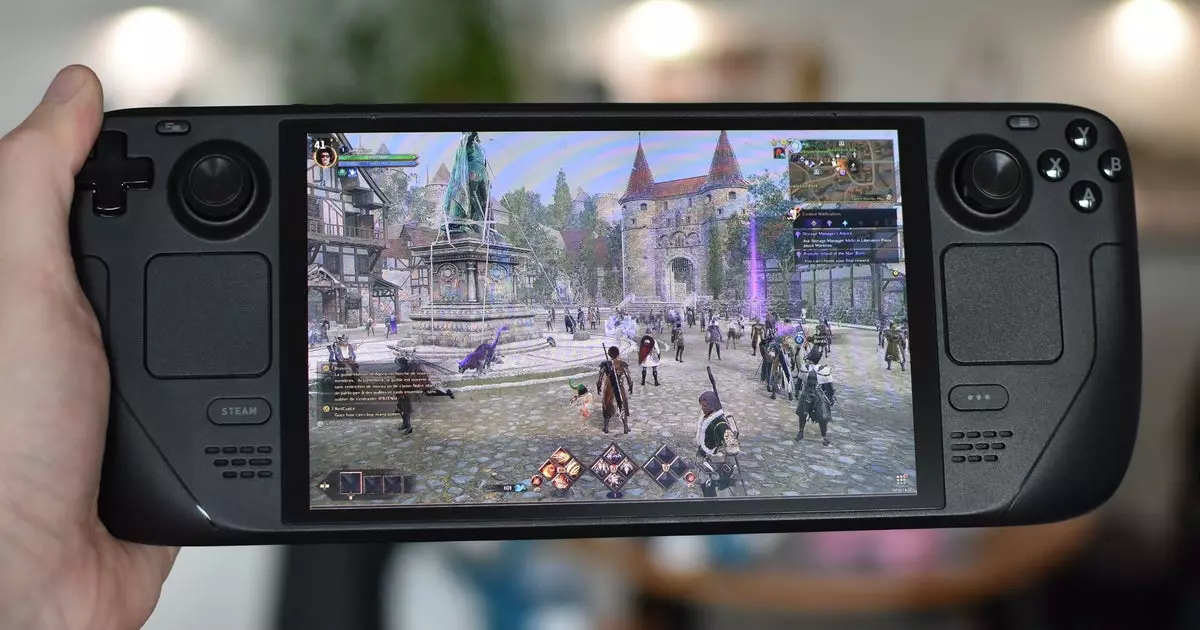Throne and Liberty, the newest fantasy MMORPG, has undeniably captivated audiences since its launch, rocketing up to impressive heights in the Steam charts almost instantly. Players and critics alike have hailed it as a significant contender in the MMORPG genre, but the launch has not been flawless. One of the hiccups that has surfaced involves issues regarding its compatibility with the Steam Deck, a handheld gaming device from Valve. This has prompted discussions about the demands of cross-platform gaming and the technical challenges that developers face, emphasizing a point of contention in the gaming community: can developers maintain seamless gameplay across numerous platforms without compromising performance?
Reports emerged shortly after the game’s release that players using the Steam Deck encountered problematic disconnections due to the presence of Easy Anti-Cheat (EAC), the system aimed at blocking hackers. A puzzling glitch appeared to strip players of their access, leaving many frustrated and disappointed. It raises questions about the testing phases of game releases and the failure to account for every platform proffered.
The issue seems to stem from an oversight by developers NCSoft and publishers Amazon Games. According to various sources, it appears they neglected to activate Easy Anti-Cheat’s Linux support in this latest version of Throne and Liberty. Valve provides documentation on how to set configurations for games on its SteamOS, suggesting that enabling EAC support isn’t as convoluted as one might assume. The fact that this essential feature was apparently overlooked points to potential lapses in communication and coordination among development teams, as well as the pitfalls that can come with launching a product under tight time constraints.
Fortunately, by October 2nd, reports indicated that the problem had been rectified, restoring functionality on the Steam Deck. This turnaround has allowed players to enjoy Throne and Liberty’s expansive world without the frustration of being booted from servers or experiencing unplanned downtime. While no one faced severe penalties, it reflects the precarious balance that developers must maintain between efficient production timelines and quality assurance—something that can lead to potentially significant reputational damage.
This situation is not without precedent; other titles have encountered similar frictions regarding anti-cheat tools and their integration into portable platforms. For example, Wuthering Waves briefly allowed gameplay on the Steam Deck before patches closed that door. Likewise, the ongoing compatibility struggles of GTA Online with BattlEye raise further questions. Why are some developers opting not to fully implement compatible solutions when they are readily available? The gaming industry at large seems to be at a crossroads regarding how to effectively handle cross-platform play and the ramifications of anti-cheat software.
Throne and Liberty’s launch troubles underscore the complexities inherent in ensuring optimal performance across the board. Developers should recognize that these issues can influence player sentiment significantly, especially when considering the competitive nature of the MMORPG market. Players expect seamless functionality and a high-quality experience, making such setbacks even more jarring.
From a gamer’s perspective, Throne and Liberty’s performance on the Steam Deck has garnered mixed reactions. While the user interface is largely functional, some players have found certain elements—particularly the microscopic UI text—to be cumbersome on a 7-inch screen. Beyond mere aesthetics, this also touches upon usability and the overall player experience, essential factors for any game as they directly influence player immersion. Although gameplay remained fluid, operating at over 30fps on Low settings, some users have suggested tweaking Settings like FSR upscaling to achieve better visual fidelity.
Creative adjustments to settings can enhance character animations and graphic responses, ensuring a smoother gaming experience. Players taking the initiative to modify settings underscore a deeper engagement with the game; however, it also begs the question of why such tweaks are necessary in the first place. The burdensome nature of fine-tuning settings can detract from the enjoyment a player seeks when diving into a new virtual universe.
Ultimately, while Throne and Liberty has encountered some hurdles post-launch, the resolution of these issues signifies a commitment to improving player experiences. Its incredible rise in popularity demonstrates that demand for immersive MMORPGs remains robust in the gaming landscape. Developers must remain responsive and proactive in addressing such technical oversights, ensuring that emerging technologies such as the Steam Deck do not become casualty to inadequate support. The journey forward must blend innovation and reliability, creating an inviting world for players to lose themselves in, free from apprehension of unexpected disconnections or inaccessible features. As the MMORPG genre continues to evolve, Throne and Liberty’s trajectory will undoubtedly be one to watch.

